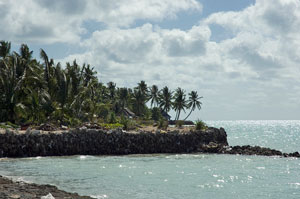For the first time, 15 Pacific Island countries and East Timor will have access to climate projections. This will fill a critical information gap identified in the 2007 Fourth Assessment Report of the Intergovernmental Panel on Climate Change as a constraint to effective adaptation action in the Pacific region. Released by the Australian Government at the end of 2011, the landmark projections–developed under the AusAID-funded Pacific Climate Change Science Program (PCCSP)–lay the foundations for building the region's capacity on and response to climate change.
Donors working in the region–including the World Bank and the Asian Development Bank–have indicated that it is appropriate for donors to use these climate change projections in their Pacific climate change development programming.
AusAID provided $20 million to PCCSP as part of the Australian Government's International Climate Change Adaptation Initiative (ICCA) jointly managed by AusAID and the Department of Climate Change and Energy Efficiency.
In addition to the reports, the PCCSP developed online climate change projections tools and conducted workshops and training activities for over 500 stakeholders on their use. The tools are designed in a user-friendly way incorporating some functions that can be used by the wider public.
The work has been very well received in the region. According to a user from Palau of the climate projections tool Climate Futures, "PCCSP Climate Futures will help us to access and provide better scientific information for Palau to plan for future climate change."
In Samoa, a user of their country report stated that there was, "…positive feedback from people from different sectors–they find the information very useful, ideal for sector planning. A Land Management Officer thought it was an excellent publication."
PNG Mama Graun CTF, a Papua New Guinea women's group from the Collingswood Bay area, used Climate Futures to determine whether climate change would exacerbate or reduce the area's natural vulnerabilities. Using the data, the group built and costed two scenarios–with adaptation and without adaptation–to assist communities, NGOs and policy makers understand tangible and intangible costs of climate change in Collingwood Bay.
The work was undertaken by the Commonwealth Scientific and Industrial Research Organisation (CSIRO) and Bureau of Meteorology (BOM) in conjunction with Pacific national and regional organisations. As part of the project, CSIRO and BOM developed rigorously peer reviewed regional and country reports including a series of brochures aimed at non-scientific audiences.
For more information on the project, visit the PCCSP website.

